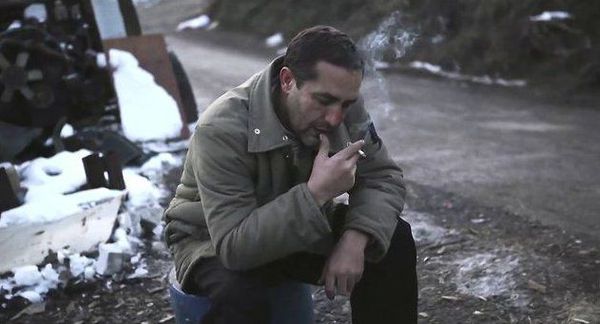Eye For Film >> Movies >> An Episode In The Life Of An Iron Picker (2013) Film Review
An Episode In The Life Of An Iron Picker
Reviewed by: Owen Van Spall

Director Danis Tanovic, from Bosnia and Herzegovina, returns for his fifth feature film with a short, minimalist piece very much in the social realist vein, featuring a cast of non-professionals and a minimum of artifice. The plot's focus on a harrowing personal ordeal spanning only a day or so, as a struggling poor Roma family bounce pinball-like from one compassionless and rickety bureaucratic agency to the other, is somewhat reminiscent of the 2005 Romanian film The Death Of Mr Lazarescu. Tanovic's film went on to scoop the Grand Jury Prize win at the 2013 Berlinale, and lead actor Nazif Muji? also took home the Berlin Silver Bear for best actor for his semi-autobiographical role.
Uninsured Roma war veteran Nazif barely makes ends meet as an iron picker to support his family. Early on in the film we see him on the hunt for scrap metal as the harsh Bosnian winter sets in around his ramshackle house, while his pregnant wife Senada (Senada Alimanovic) tends to their home and their two young daughters. We see the hard work this scavenging involves, all splintered wood panels and jagged screeching metal, as cars, fridges and other detritus gets scooped up by Nazif and his brother, hefted into the back of their car, and driven down to the scrapyard. It is as if these poor people are having to consume their own surroundings to survive (later in the film Nazif will have to cut up his own car to pay for medical services, begging the question of how far this way of life can go on before these disenfranchised people have used up all they have left.)

Coming home after a long day's work, Nazif finds Senada laid up in pain. When she doesn't improve, he has to drive her to the nearest clinic, where the diagnosis is that Senada has miscarried her five-month old fetus. Senada needs immediate treatment at a faraway city hospital, but a long road trip there only results in Nazif going up against bureaucratic obstruction. Neither he nor his wife have state-provided health insurance, meaning the hospital requests that Senada pay 980 Bosnian marks (500 euros) for the essential surgery.
With this sum a preposterous amount of money to ask from for an iron picker, Nazif is forced to return home to the poverty-stricken Roma community to try to find some other way to either get an insurance card, or get the money. As institutional doors close in their faces, and large, ominous factory chimneys belch smoke impassively in the distance, Nazif and Senada cut increasingly desperate, tiny, shuffling figures as the days wear on and they shuttle back and forth from one potential lifesaver to another.
Drawing from real life events, Tanic's docudrama gains its power from the emotionally stirring scenario and all-round naturalistic performances, which feel infused with greater honesty given that a version of this nightmare has been played out in real life. The strikingly bleak landscapes also charge the atmosphere with doom - this is a land where even the ground, snow covered and littered with the detritus of once-useful household goods, looks as though it has turned its back on the people.
An unashamedly angry picture, yet one that also celebrates the solidarity and courage of a oppressed minority in the face adversity, Tanic's latest is ultimately a tad too heavy handed and could have done with an injection of a certain urgency to truly take us into the heart of the emotional storm this family have been suddenly tipped into. Tanic might keep the camera up close to his cast in the verite style, but he also keeps us the viewers too much at arm's length.
Reviewed on: 03 Mar 2014

















